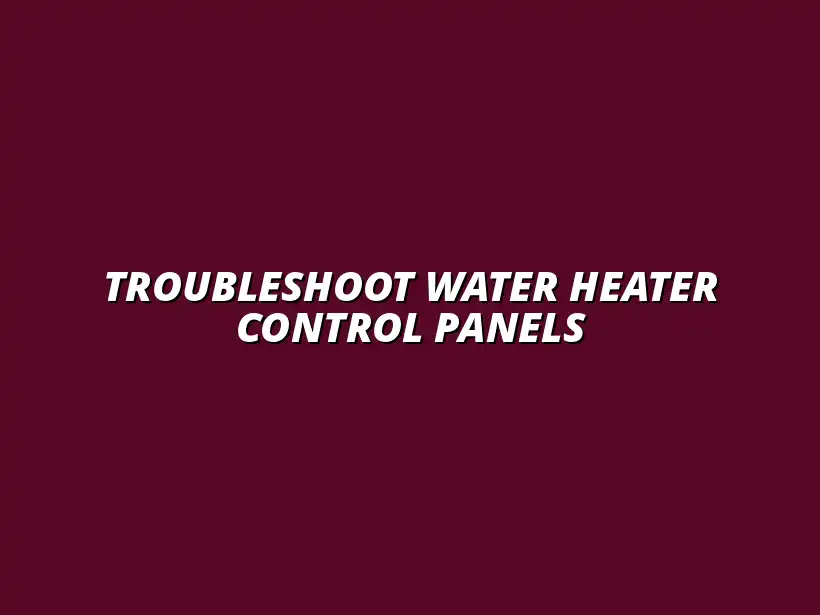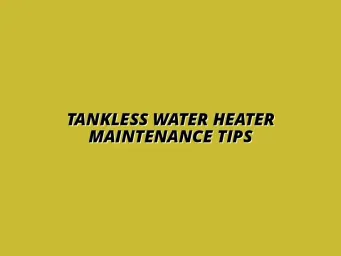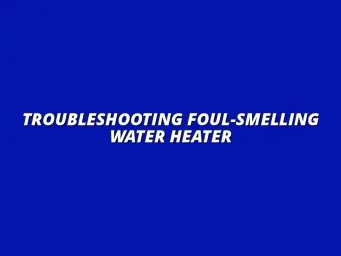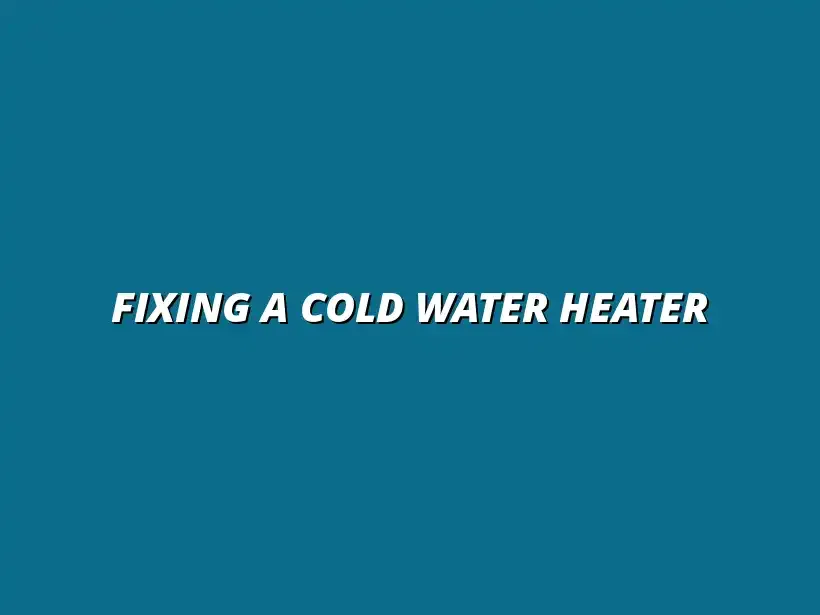
Troubleshoot Water Heater Control Panels
Understanding Water Heater Control Panels and Their Importance
Water heater control panels are vital components in any heating system. They allow users to manage the temperature and functioning of their water heaters effectively. Understanding these panels can save you a lot of time, energy, and unnecessary expenses!
When you think of a water heater, it’s easy to overlook the control panel's significance. However, this interface is where you set your desired water temperature, monitor operational status, and troubleshoot any issues that arise. Without a well-functioning control panel, your water heater may not operate efficiently. If you're facing issues starting your water heater, a helpful guide on fixing a water heater that won't start might be useful.
The Role of Control Panels in Water Heaters
The control panel is essentially the brain of your water heater. It interprets user commands and translates them into actions, ensuring that water is heated to the right temperature. Additionally, it monitors various safety parameters to keep your home safe.
Control panels also play a critical role in energy efficiency. By allowing you to set the temperature precisely, these panels help in reducing energy consumption. This not only conserves energy but also results in lower bills every month! For tips on maintaining your water heater efficiently, check out this guide on maintaining your water heater efficiently.
- Temperature control
- Safety monitoring
- Energy efficiency
- System diagnostics
Common Issues Associated with Water Heater Control Panels
Like any appliance, water heater control panels can experience problems. Some common issues include incorrect temperature readings, failure to turn on, or unresponsive buttons. Recognizing these problems early can help prevent further damage!
Another typical concern is electrical faults, which may arise from poor wiring or a malfunctioning circuit. If you notice any warning signals, it's best to take action before things worsen. Ignoring these signs can lead to expensive repairs or even replacement. Knowing how to troubleshoot common bathroom plumbing issues can be helpful in identifying similar problems in your water heater. Here's a great resource for troubleshooting bathroom plumbing issues.
- Incorrect temperature settings
- Unresponsive control buttons
- Electrical malfunctions
- Faulty display indicators
Summary of Troubleshooting and Repair Techniques
Troubleshooting water heater control panels can seem daunting, but it’s really about following a few straightforward steps. It’s essential to start by identifying any power issues, checking fuses, and inspecting connections. This sets the foundation for effective diagnosis and repair!
Once power issues are ruled out, the next step is to diagnose any potential malfunctions in the control panel. Look for signs like irregular temperature readings or unresponsive buttons. Taking your time with these steps can save you from unnecessary repairs later. If you need to replace your water heater thermostat, this guide on replacing your water heater thermostat may be beneficial.
Recap of Essential Steps in Troubleshooting Water Heater Control Panels
- Check circuit breakers and fuses to ensure power supply.
- Inspect the control panel for physical damage or loose connections.
- Look for signs of malfunction, like unexpected temperature changes.
- Utilize diagnostic tools to pinpoint issues accurately.
By following this structured approach, you can tackle most issues with confidence! Remember, a clear plan will not only streamline the troubleshooting process but also help you understand your water heater better. Learning how to clear clogged drains can also be a helpful related skill; see this guide on clearing clogged drains with a pressure washer.
Key Takeaways for Successful Repair
When it comes to repairing water heater control panels, knowledge is your best tool. Knowing the typical *symptoms* of issues and having the right tools on hand makes a world of difference. Plus, being aware of when to reset or calibrate the panel can help maintain its efficiency.
Also, don’t forget to keep a log of repairs and maintenance activities. This record can be invaluable for future troubleshooting and can guide the next person who works on the heater!
- Always document repairs and settings changes for reference.
- Stay informed about common issues and their solutions.
- Know your limits—don't hesitate to call a professional if needed! For plumbing help in Billesley, Birmingham, consider contacting a plumber in Billesley, Birmingham.
Encouragement for Proactive Maintenance
Proactive maintenance is key to extending the life of your water heater! Regular checks can help you catch problems before they escalate, saving you time and money in the long run. A little bit of attention now can lead to a lot of peace later.
Along with checking the control panel, consider scheduling yearly inspections. This is a smart way to ensure everything is running smoothly and to prevent major breakdowns. Addressing kitchen sink leaks proactively can also prevent larger issues. Here's how to fix kitchen sink leaks with this DIY guide.
Regular Maintenance Practices to Extend Water Heater Life
- Flush the tank annually to remove sediment buildup.
- Inspect the anode rod and replace it as needed.
- Check temperature settings to avoid overheating.
- Examine the pressure relief valve for proper operation.
These simple steps can go a long way in keeping your water heater in great shape! By staying proactive, you’ll not only increase the lifespan of your unit but also ensure it operates efficiently.
Resources for Ongoing Education and Support in DIY Repairs
There are plenty of resources available to help you become a DIY repair expert! Online forums, instructional videos, and manuals can provide guidance and solutions to many common problems. Plus, don't forget about local workshops or community classes that can offer hands-on learning experiences.
Books and websites dedicated to home repair are also great sources of information. They can help you troubleshoot issues and become more familiar with your water heater!
- Online video tutorials for visual learners.
- Home repair books from local libraries or bookstores.
- DIY forums where you can ask questions and share tips.
Engaging with these resources can boost your confidence and skill set, making home repairs feel more manageable! So, dive in and start learning today!




